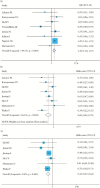Systematic Review and Meta-analysis: Phenotype and Clinical Outcomes of Older-onset Inflammatory Bowel Disease
- PMID: 26928965
- PMCID: PMC6082591
- DOI: 10.1093/ecco-jcc/jjw054
Systematic Review and Meta-analysis: Phenotype and Clinical Outcomes of Older-onset Inflammatory Bowel Disease
Abstract
Background: Little is known of the clinical outcome of patients with older-onset inflammatory bowel disease [IBD]. We performed a systematic review to determine phenotype and outcomes of older-onset IBD compared with younger-onset subjects.
Methods: A systematic search of Embase and Medline up to June 2015 identified studies investigating phenotype and outcomes of older-onset [diagnosed at age ≥ 50 years] Crohn's disease [CD] and ulcerative colitis [UC] subjects. Pooled analyses of disease phenotype, medication use, and disease-related surgery were calculated.
Results: We analysed findings from 43 studies comprising 8274 older-onset and 34641 younger-onset IBD subjects. Compared with younger-onset patients, older-onset CD patients were more likely to have colonic disease (odds ratio [OR] 2.56, 95% confidence interval [CI] 1.88 - 3.48) and inflammatory behaviour [OR 1.19, 95% CI 1.07 - 1.33], and less likely to have penetrating disease or perianal involvement. More older-onset UC patients had left-sided colitis [OR 1.49, 95% CI 1.18 - 1.88]. Although fewer older-onset IBD patients received immunomodulators [CD: OR 0.44; UC: OR 0.60] or biologicals [CD: OR 0.34; UC: OR 0.41], older-onset CD was similar in the need for surgery [OR 0.70, 95% CI 0.40 - 1.22] whereas more older-onset UC patients underwent surgery [OR 1.36, 95% CI 1.18 - 1.57].
Conclusions: Elderly IBD patients present with less complicated disease, but have similar or higher rates of surgery than non-elderly patients. Whether this reflects a non-benign disease course, physicians' reluctance to employ immunomodulators, or both, merits further study which is essential for improving the care of IBD in the elderly.
Keywords: Older-onset IBD; natural history; outcomes; phenotype.
Copyright © 2016 European Crohn’s and Colitis Organisation (ECCO). Published by Oxford University Press. All rights reserved. For permissions, please email: journals.permissions@oup.com.
Figures









References
-
- Molodecky NA, Soon IS, Rabi DM, et al. Increasing incidence and prevalence of the inflammatory bowel diseases with time, based on systematic review . Gastroenterology 2012. ; 142 : 46 – 54 e42 ; quiz e30. - PubMed
-
- Benchimol EI, Fortinsky KJ, Gozdyra P, et al. Epidemiology of pediatric inflammatory bowel disease: a systematic review of international trends . Inflamm Bowel Dis 2011. ; 17 : 423 – 39 . - PubMed
-
- Ruel J, Ruane D, Mehandru S, et al. IBD across the age spectrum: is it the same disease? Nat Rev Gastroenterol Hepatol 2014. ; 11 : 88 – 98 . - PubMed
-
- Ha CY, Katz S . Clinical implications of ageing for the management of IBD . Nat Rev Gastroenterol Hepatol 2014. ; 11 : 128 – 38 . - PubMed
Publication types
MeSH terms
Substances
Grants and funding
LinkOut - more resources
Full Text Sources
Other Literature Sources
Medical

